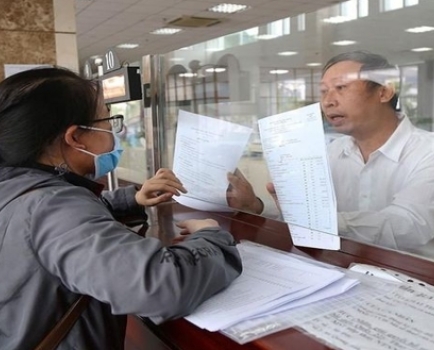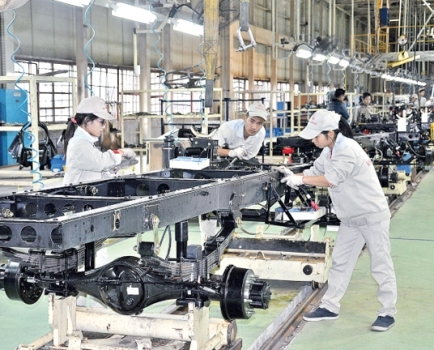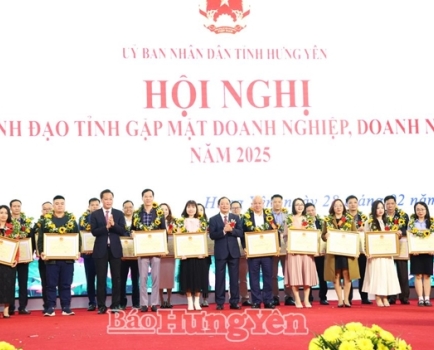Do not let businesses spend more time and money
Tue, 25 Mar 2025 14:45:00 | Print | Email Share:
The draft Law amending and supplementing a number of articles of the Law on Product and Goods Quality is being drafted by the Ministry of Science and Technology and is expected to be submitted to the National Assembly for comments at the 9th Session (May 2025).

Workshop on Comments on the Draft Law on Product and Goods Quality organized by the Vietnam Chamber of Commerce and Industry
Facing many changes
“Enterprises are always afraid of things that are unclear,” Mr. Truong Van Cam, Vice President and General Secretary of the Vietnam Textile and Apparel Association (VITAS), shared this right when he started speaking at the Workshop on Comments on the Draft Law on Product and Goods Quality (Draft) organized by the Vietnam Chamber of Commerce and Industry (VCCI) earlier this week.
Previously, the new contents of the Draft were sent to businesses by the National Committee for Standards and Quality Measurement (Ministry of Science and Technology). The major concern of businesses is the contents related to policy amendments.
According to the Draft Proposal, the Law on Product and Goods Quality (2007) has not fully met international treaties and obligations in free trade agreements that Vietnam has participated in. Therefore, the amendment will ensure a complete and consistent system of legal documents on product and goods quality, creating a necessary legal framework for the implementation of state management activities on product and goods quality, ensuring consistency in the application of laws on product and goods quality, contributing to creating a healthy investment and business environment, in accordance with international practices, in accordance with the Agreement on Technical Barriers to Trade (TBT Agreement) of the World Trade Organization (WTO) and chapters on technical barriers to trade of new-generation free trade agreements (CPTPP, EVFTA, RCEP...).
With this view, there are four policy groups that will be revised.
First, innovate the identification of products and goods that are potentially unsafe (group 2 products and goods).
Second, applying technology in quality management and traceability of products and goods.
Third, developing national quality infrastructure ensures the goals of sustainable development and international integration.
Fourth, enhance the effectiveness of product and goods quality management activities, promote the assignment and decentralization of management to suit the current practical situation.
In particular, the Draft has reviewed 8 groups of administrative procedures, of which 3 administrative procedures have been abolished, including conformity declaration and quality inspection registration for some imported group 2 goods; registration of conformity assessment activities; amendment of 5 administrative procedures (registration of quality inspection for some imported group 2 goods; registration of exemption from quality inspection of imported goods; issuance of certificates of right to use codes and barcodes; registration of designation of conformity assessment standards; registration of assessment expert training activities).
But because there are many changes, businesses need the contents stated in the Draft to be clear, transparent and create conditions for businesses to operate. "Do not let businesses waste more time and money", Mr. Cam sent to the Drafting Committee.
The problems are not small
Ms. Dao Thi Thu Huyen, Deputy Director of External Affairs Department (Canon Vietnam) brought to the Workshop a comparison of international practices on product and goods quality with Vietnamese regulations. In particular, "checking" 10 regulations, such as deciding and announcing the quality level of products produced by enterprises; deciding on internal control measures to ensure product quality; choosing conformity assessment organizations to test, inspect, appraise, certify product and goods quality..., comparing with 5 international markets, including China, Japan, Korea, Europe and the US.
“Most of the most advanced countries do not have strict regulations like Vietnam,” Ms. Huyen shared information received from comparisons.
The emergence of new procedures leads to increased human resources and costs.
- Ms. Dao Thi Thu Huyen, Deputy Director of External Affairs Department (Canon Vietnam)
“The current process for producing and exporting goods is from 1 to 2 months, while according to the Draft Law on Product and Goods Quality, it is from 3 to 8 months. For example, regarding the responsibility for deciding and announcing the quality level of products they produce and supply, enterprises must go through a multi-step process to request product quality announcement, from preparation, submission of documents, assessment and receiving written responses.
According to the Draft, when new procedures arise, it takes at least 1 month from preparation to approval, leading to increased human resources, costs and the risk of not being able to export orders on time.”
Similarly, the regulations of the Law on Product and Goods Quality related to imported and exported goods are also stricter than the regulations of some compared economies. In particular, Ms. Huyen said, advanced countries do not require many responsibilities for exported goods, only tightening regulations on health-related items such as food, pharmaceuticals, etc.
But the issue that makes Ms. Huyen feel most worried is that the current regulations are very strict, even stricter than many advanced countries in the world, but the Draft that the Ministry of Science and Technology is currently submitting for comments is even stricter.
“The draft has changed the regulations on applying traceability codes and electronic labels from optional to mandatory. Thus, businesses will have to carry out additional registration procedures to meet the regulations, which also means increasing human resources, time and implementation costs,” Ms. Huyen analyzed.
Of course, the consequence will be increased product prices, negatively affecting consumer purchasing power, leading to reduced business revenue...
“We recommend amending the Draft to reduce existing administrative procedures and not increase them compared to the regulations of advanced countries such as Japan, Korea, Europe, and the US. At the same time, inspection of goods in circulation on the market needs to be strengthened,” Ms. Huyen recommended.
Regarding this issue, a representative of WinCommerce General Trading Services Joint Stock Company said that the enterprise strongly agrees with the Party and State's policy on applying technology to manage the quality of products and goods, including applying codes, barcodes, and electronic labeling, helping parties involved in the supply chain to trace the origin, recall products, manage production, transportation, and sales more easily.
However, the new requirements also pose a problem for businesses in developing appropriate infrastructure and information technology systems to manage complete data, integrating data from different departments, from production, quality control, warehousing and distribution.
“With major challenges in technology deployment, increased investment costs will create financial pressure and affect the competitiveness of businesses, especially small and medium-sized enterprises. This also leads to the inevitable consequence of increasing product prices, directly affecting the interests of domestic consumers. In addition, detailing traceability, for example including detailed information on storage, preservation and transportation facilities, will also create difficulties in labeling goods and affect the competitiveness of businesses,” said a business representative.
Therefore, businesses propose that state agencies apply the roadmap, in accordance with the actual situation of the business, as well as provide detailed support and guidance for businesses to implement in the most convenient way, minimizing arising costs.
By: Khanh An (Investment Newspaper)/Translator: LeAnh-Bizic
---------------------------------------------
Same category News :













